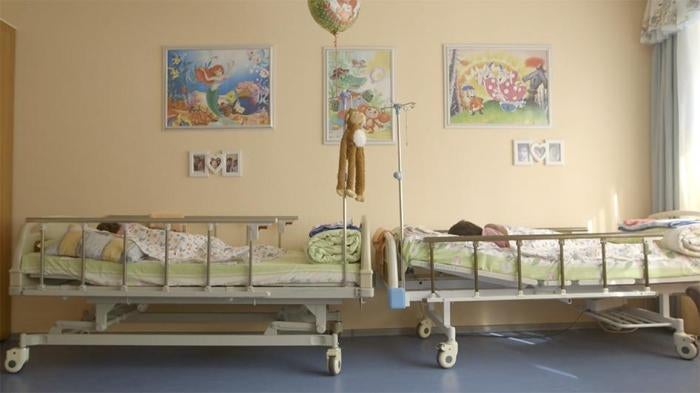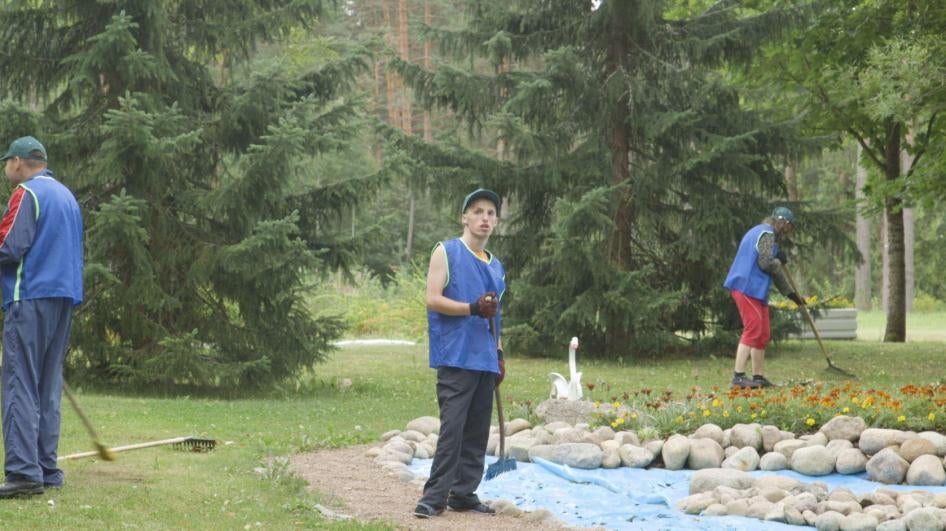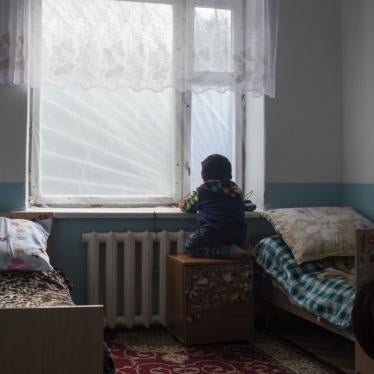(Moscow) – Russian orphanages where children with disabilities grow up often transfer them to closed state institutions for adults when they reach 18 without their consent, Human Rights Watch said today. Those who do move into the community often do not receive the support they need to live independently.
In research from five cities in Russia in 2018, Human Rights Watch documented 28 cases in which directors of children’s orphanages forced or coerced children with a range of disabilities into adult institutions once they turned 18. When children turn 18, they are legally adults and have the right to live independently and be included in the community.
“Russian authorities should immediately ensure that staff at government-run institutions stop forcibly transferring young people with disabilities to adult institutions, leaving them isolated and segregated for their entire lives,” said Andrea Mazzarino, researcher at Human Rights Watch. “Becoming an adult should be an opportunity to make choices and experience all that life has to offer, not to remain isolated and under others’ control.”
In recent years, the government has introduced important measures designed to protect the rights of people with disabilities. These include a law banning disability-based discrimination and guaranteeing inclusive education, and a 2014 regulation defining orphanages as temporary institutions that should prepare children for independent life. But these laws often are not observed or enforced, Human Rights Watch found.
Russian disability experts told Human Rights Watch that most people with disabilities who enter institutions in Russia remain there indefinitely. An estimated 150,000 adults with disabilities are in institutions in Russia.
Ten young adults described to Human Rights Watch how orphanage directors transferred them to closed adult institutions for people with various disabilities, known in Russia as psychoneurological internats, without offering them any alternative. Some were placed in vehicles and taken to adult institutions without explanation. Others said that orphanage directors pressured them to sign paperwork agreeing to be placed in adult institutions.
A local disability rights lawyer and two local disability rights advocates told Human Rights Watch about 18 additional cases of young people transferred from a St. Petersburg orphanage to a St. Petersburg adult institution in late 2017, without the young peoples’ consent.
Other young people told Human Rights Watch they consented to go to an adult institution, but that they felt compelled to do so because they did not know they have the right to live independently in the community.
In the majority of cases Human Rights Watch documented, orphanage personnel petitioned local courts to strip the young people of their legal capacity, or the right to make decisions for themselves, and to appoint a guardian, typically an institution director.
People with disabilities, activists, and lawyers in Russia said that orphanage officials often do not inform people with disabilities about the legal capacity proceedings concerning them. Dmitri Bartenev, a lawyer and expert in Russian disability law and judicial practice, said that “it is common practice for institutions to petition courts to deprive people of legal capacity when they turn 18,” and that the judges don’t always meet with individuals who are threatened with having their legal capacity stripped, in violation of Russian law.
A judge in legal capacity proceedings often orders a psychiatric assessment to determine a person’s ability to make decisions for themselves. These assessments require a person to answer questions about everyday life, such as grocery shopping. Young people with disabilities who have grown up in orphanages have had little or no opportunity for practical life experiences, leaving them vulnerable to a decision to deprive them of their legal capacity based on this assessment.
Several of those interviewed who did participate in legal capacity proceedings said that they had no viable means to challenge orphanage staff’s petition because no one had ever explained their rights and legal options.
Once young people enter adult institutions, they may face restrictions on their freedom of movement, including their ability to leave institutions and on their ability to visit and communicate with friends and relatives. Four people interviewed faced difficulties leaving institutions to live in the community even after they told institution staff that they wished to do so. Confinement in an institution on the basis of a disability without an individual’s consent constitutes unlawful detention.
Human Rights Watch also interviewed young people who left orphanages and now live on their own with the support of relatives, volunteer activists, or nongovernmental organizations (NGOs). They described how the lack of adequate education while in the orphanage, the staff’s failure to prepare them for adulthood, and lack of accessible infrastructure and health care impeded their ability to establish independent lives. Three people also said that orphanage directors maintained control over them after they left, such as by maintaining control over their government disability pension.
The Russian government should stop using coercion and deception to transfer people with disabilities to adult institutions, and end policies and practices to deny them legal capacity. It should amend federal laws that allow them to be stripped of legal capacity and provide them with full information about their rights, including to live independently in the community. It should provide programs to help them move into the community with assisted decision-making and other support they need.
The government should also make certain that personnel at institutions for people with disabilities get training on the rights of people with disabilities. It should establish a time-bound plan to end residential institutions for people with disabilities except in emergencies, and to provide options for family or other long-term care as needed.
Russia has obligations under the international disability rights treaty to ensure that people with disabilities can live independently and be included in the community. Every adult has the right to legal capacity, or the right to make decisions for themselves, such as where to live, whom and whether to marry, to sign a contract, to buy property, and other decisions. The European Convention on Human Rights (ECHR), to which Russia is also a party, also provides protections for private and family life, including the right to make choices about one’s life such as the choice to establish relationships with others.
“Russia’s recent steps to better protect the rights of people with disabilities are critical,” Mazzarino said. “But the government also needs to make a clear plan to stop confining people with disabilities and make sure they can live independently in the community, with support if they request it.”
For accounts of young people with disabilities interviewed, please see below.
Russian Law and Transfers to Institutions
Under the Russian Law on Psychiatric Care a person must give consent to be moved into an adult institution for people with disabilities, even if they have been deprived of their legal capacity. But disability rights lawyer and a Russian legal expert, Bartenev, said that many orphanage staff assume that a person deprived of legal capacity can and must be placed in an adult institution, even without their consent, particularly if that person does not have family or friends to care for them.
Under the Law on Psychiatric Care a local guardianship and custody agency can order placing someone in an institution without their consent, based on a medical assessment that a person is incapable of giving consent. The written statement from the medical commission must include evidence of the person’s disability and the reasons why the person is being placed in a particular institution. Human Rights Watch was not able to find evidence that any of the cases documented had this kind of determination.
Accounts from Young People with Disabilities
Human Rights Watch spoke with 18 young people with disabilities, ages 18 to 26, including people who are blind, have limited mobility, or have psychosocial disabilities, or mental health conditions, such as schizophrenia, in St. Petersburg, Leningrad region, Moscow, the Moscow region, and the Sverdlovsk region. Human Rights Watch documented the cases of 18 additional young people with disabilities through interviews with local activists who advocated for these young people’s right to live in the community.
Human Rights Watch also interviewed five children ages 10 to 15 who live in orphanages, 10 staff from orphanages and adult institutions for people with disabilities, 30 representatives from organizations that advocate for the rights of children and adults with disabilities, and three adults with disabilities who grew up in families. Human Rights Watch also interviewed two lawyers who represent children and adults living in closed state institutions in Russia. Human Rights Watch visited three orphanages for children with disabilities in the Moscow region and in St. Petersburg, and two adult institutions for people with disabilities in St. Petersburg. The full names of young people interviewed have not been used or their names have been changed to protect their privacy.
Deprivation of Legal Capacity and Placement in Adult Institutions
Among those interviewed were four young adults who spent their childhoods in Leningrad region and St. Petersburg orphanages for children with developmental disabilities. Orphanage administrators successfully petitioned local courts to deprive each of them of their legal capacity as they neared their 18th birthdays. Orphanage directors then transferred them to adult institutions in St. Petersburg.
Alexei
Alexei, 21, spent his childhood in a Leningrad region orphanage for children with developmental disabilities, and has lived in an institution for adults with disabilities in St. Petersburg since 2015. He said that when he turned 18, the orphanage director successfully petitioned a court to strip him of his legal capacity.
As part of the court proceeding to determine his capacity for independent living, a local commission of medical and education professionals asked him questions about daily living. While at the orphanage, however, staff had not taught Alexei practical skills or helped him become familiar with the world outside the orphanage. “They asked me about what things cost at the grocery store. I had never been to a grocery store,” he said.
Shortly after the commission’s review and a judge’s subsequent decision to deprive Alexei of his legal capacity, the orphanage director showed Alexei a document in which she, now his legal guardian, had authorized his transfer to an adult institution. He had no opportunity to challenge the decision.
Shortly thereafter, the director instructed Alexei to go with an orphanage social worker, who took him on a streetcar to the institution where he currently lives.
Alexei said that life in the institution is “harsh, with many rules.” He is unable to leave the building after dark or to leave the institution grounds without the administration’s permission. He said the institution director sent him to a psychiatric hospital several times as punishment for fighting with another resident. “I want to leave and live in my own apartment,” he said.
Tanya
Tanya, 19, has low hearing and a kidney condition, and uses a wheelchair. When asked how she came to live at the adult institution where she resides, Tanya replied, “I don’t know why I am here.”
Two local activists who visited Tanya before and after her transfer to the adult institution in late 2017 said that the director of the orphanage where Tanya grew up had petitioned a court to remove Tanya’s legal capacity. The director claimed that Tanya’s disabilities left her incapable of making informed decisions about her own life.
Like Alexei, Tanya faced a commission of medical and education professionals tasked with determining her capacity to make decisions for herself. Tanya had not been able to spend sufficient time outside of the orphanage to answer qualifying questions, such as about the costs of various foods. She had not been provided with a hearing aid and struggled to hear the questions.
Tanya said she wants to be able to go for walks outside of the institution grounds, and to spend time with women her age from a local nongovernmental group who occasionally visit her. “I like to go to festivals and concerts,” she said. “Here there is nothing.” And she added, “I don’t want to live anymore.”
Anastasia
Anastasia, 22, grew up in a St. Petersburg orphanage and has lived in a St. Petersburg adult institution since 2016. She has a physical disability and a developmental disability and uses a wheelchair. Like Alexei and Tanya, Anastasia was deprived of legal capacity. She said that orphanage staff had not given her a choice about going to the institution or information about her destination. Asked about her life in the institution, Anastasia said, “I don’t like it here.”
“Misha”
“Misha” (not his real name), 18, has a physical and developmental disability and lives in a St. Petersburg institution for adults with disabilities. An activist familiar with the situation for young people in the institution, including Misha, said that Misha and 24 others, including Tanya, had been deprived of legal capacity and transferred to the institution by orphanage staff. The activist said the orphanage had no procedure, as far as he she could tell, to inform the young people of where they were going, but that 18-year-olds at that orphanage are routinely transferred without accessible information on their destination.
“Karina”
In some of the cases Human Rights Watch documented, orphanage directors compelled young people to agree to their transfer to adult institutions. “Karina,” 19, grew up in an orphanage for children with developmental disabilities in the Leningrad region. Karina reported that shortly after her 18th birthday in 2017, the orphanage director handed her a sheet of paper, but she had never been allowed to attend school and couldn't read it. She said the orphanage director told her, “Sign this. You’re going to the internat [closed medical institution].” Seeing no other choice and having no information about options to live in the community, Karina signed the document, which was an authorization for her transfer to an adult institution.
“Kirill”
In other cases, Human Rights Watch documented how orphanage staff transferred young people to adult institutions directly, without the individual’s consent or knowledge about how that decision was made. “Kirill,” 26, who has a developmental disability, grew up in a St. Petersburg orphanage. He said that one day in 2012, orphanage staff told him to get into a van that took him and several other young people from the orphanage to an adult institution in St. Petersburg, without informing them of the destination. Human Rights Watch could not determine whether “Kirill” and the others transferred with him had been deprived of their legal capacity.
In the adult institution, staff forced Kirill and the other young people to remain in bed for several weeks and undergo medical tests. Kirill said he did not consent to the medical tests.
Once in the adult institution, Kirill was not provided with many of the activities that he had in the orphanage, such as going for walks with volunteers from nongovernmental groups. In 2015, Kirill asked the director if he could leave the institution and live on his own. “She told me I am not capable of living independently,” Kirill said.
In 2015, Kirill met a group of volunteers from a local disability rights group, who helped him leave the institution. They also helped him to rent an apartment, find a cleaning job at a local store, and learn skills such as cooking and managing money. The orphanage had not allowed Kirill to go to school and did not teach him any skills for independent living. Kirill said, “It’s great living on my own. I have work. I have obligations to my supervisor, to my friends. I am getting to know the country where I was born.”
“Dima”
In 2018, adult institution officials sent “Dima,” 19, who has a developmental disability, to forced treatment in a psychiatric hospital for three days after Dima and another young man with a developmental disability, “Vadim,” met with a lawyer to challenge the officials’ court petition to strip them of their legal capacity. The officials claimed they sent Dima to the hospital for an outside medical opinion on his ability to make decisions for himself, but Dima’s lawyer said that he did not consent to this treatment and that he lay in bed for three days with no testing. Dima believes that the move was in retaliation for challenging the efforts to deprive him of his legal capacity after he asked to leave the institution and live on his own.
Dima was able to get the institution’s petition to the court dropped and was eventually able to join Vadim at a community-based assisted living facility with the support of two local nongovernmental organizations.
Vlad
Vlad, 19, who is blind, grew up in an orphanage for children with disabilities in the Moscow region. Although he studied for six years in a special school for children who are blind, Vlad described the lack of support to develop skills needed for his transition to adulthood:
Any time we tried to make our own decisions, they [the orphanage staff] asked questions: “Why? Why would you buy that? Why did you choose that nickname for yourself? Why do you need to go into town?” Independence is the ability to think for yourself. For example, if you want to go somewhere, you should know how to find the right public transport, how to pay for it, and how to ask someone for help. This kind of learning was absent.
When he was 14, Vlad told the orphanage directors that he wanted to live on his own as an adult. The directors tentatively agreed but sought to maintain control over him. Vlad recalled one of them saying, “Well, then we need you to keep coming back. You are obligated to remain under our watch, and to do as we say.”
Vlad left the orphanage when he was 18 and enrolled in a local college. Although the orphanage was no longer his guardian, for three weeks after his departure the orphanage director refused to allow Vlad to access his government disability pension, which continued to go to the orphanage. “During weekly visits, I had to answer questions about how I spent the money she gave me,” he said. “She didn’t even give me my full pension.”
Vlad regained control of his finances with the help of the college director and a mentor from the orphanage, who went before a local commission to seek approval for him to live independently.
“Maria”
“Maria” 20, who has a physical disability and uses a wheelchair, grew up in an orphanage for children with disabilities in St. Petersburg. In 2016, Maria heard that another young person in her group planned to move to an apartment in St. Petersburg, and she told an orphanage social worker that she wanted to do the same. The social worker connected Maria with a local group, which helped her to find an apartment.
Although Maria lives independently, her time in the orphanage compromised her ability to support herself. “I never got an education in the orphanage,” she said. She needs to complete six years of missed education to enroll in a local college and is studying online. Attending college could still be difficult as the college in her neighborhood lacks an elevator that would enable her to attend classes on the second floor.
“Sveta” and “Ivan”
“Sveta” and “Ivan,” both 23, are a married couple who grew up together in a St. Petersburg orphanage. Sveta, who has a physical disability that affects her mobility, described how as she became a teenager, she began to think about leaving the orphanage.
I told the social workers, “I want to live independently.” They responded, “You’ll go hungry. You don’t know how to spend money. Your [disability] pension isn’t enough to live on.”
Around Sveta’s 18th birthday, the orphanage director called Sveta to her office and gave her a document to sign that would have authorized her transfer to a St. Petersburg adult institution:
I could not read it because I didn’t own eyeglasses. I asked them to read it for me, and they said, ‘No. That’s your job.’ My grandmother told me never to sign a document without reading it or knowing what it says. So, I didn’t sign it.
In 2013, a local group helped Sveta move to their group apartment for young people with disabilities leaving the orphanage. Sveta and Ivan were engaged.
When Ivan turned 18 that same year, he told the orphanage director that he wanted to go to a particular adult institution that he believed would be nearer to his sister and her family. Although he and Sveta were already engaged, Ivan believed that his only option was to live in an institution. The staff granted Ivan’s request.
But Ivan soon realized that he had misread the map and the institution was not near his family. The institution director limited Ivan’s telephone contact and visits with his sister and with Sveta. He told the institution director that he wanted to live outside the institution with Sveta. The director responded by threatening to petition a court to deprive Ivan of his legal capacity.
Ivan contacted his sister, who sought outside legal help. The institution director threatened to send Ivan to a psychiatric hospital if he continued to fight for his legal capacity and seek to live on his own. Before she could act on her threat, with the help of his sister, Ivan left the institution and joined Sveta.
In 2016, the couple married and moved to an apartment owned by Ivan’s family.
Sveta and Ivan face many challenges living in the community. Their third-floor apartment building lacks an elevator, making it difficult for Sveta to get in and out. She also has difficulty getting health care and physical therapy at her local state clinic because “doctors look at me and tell me I need to be in an inpatient hospital.” They spend a substantial portion of their pensions on health care at private clinics, which does not leave them enough for sufficient food.
Sveta works on a contractual basis as a taxi dispatcher. She received most of her education at the orphanage, although she attended a community-based school for two years. Ivan received only limited education in the orphanage.
Ivan would like a job, but his documentation from the orphanage states that he is “unable to work,” even though he has no documented disability that would preclude him from working. To apply for a job, Ivan would need to visit multiple doctors and convince them to revise this paperwork.
Despite these difficulties, Sveta and Ivan are confident that they have made the right choice. Sveta said, “It’s our life. Our mistakes are our mistakes. And we are in love.”
Rights to Private or Family Life, Effective Remedy, Freedom from Arbitrary Detention
Russia is party to the ECHR, which guarantees freedom from interference in a person’s private or family life, including the right to make choices about one’s life such as the choice to establish relationships with others. The ECHR also guarantees the right to correspond with friends and family and the right to respect for one’s home. States parties have a positive obligation to ensure conditions for the realization of these rights.
Russia is also a party to the Convention on the Rights of Persons with Disabilities (CRPD), which requires governments to provide opportunities for people with disabilities to live independently in the community, with support as necessary, including the development of an inclusive and accessible environment. States parties to the CRPD should make information accessible to people with disabilities.
Children are guaranteed special protection and care by international law, in particular under both the International Covenant on Civil and Political Rights (ICCPR) and the Convention on the Rights of the Child (CRC), which Russia has ratified. Protections are heightened for children who are in institutional care. The CRC provides that, “a child temporarily or permanently deprived of his or her family environment. shall be entitled to special protection and assistance provided by the State.” The state therefore has special duties toward these children, among which is to help them prepare for adulthood.
The United Nations Committee on the Rights of the Child has specifically addressed the situation of adolescents, including adolescents with disabilities, in alternative care. Noting the “significant evidence of poor outcomes for adolescents in large long-term institutions” the committee also recognizes that “those with disabilities are often denied opportunities for community living and are transferred to adult institutions, where they are at increased risk of being subjected to continuing violations of their rights.”
The committee notes that states have obligations “to adopt measures to support the independence and improve the life chances of adolescents in alternative care and address the particular vulnerabilities and insecurities they face as they become old enough to leave such care.” It has said that governments should ensure “support in preparing for the transition, gaining access to employment, housing and psychological support.”
Under the ICCPR, the ECHR, and the CRPD, in the determination of a person’s civil rights, that person is entitled to a fair and impartial hearing. Anyone whose rights have been violated is entitled to an effective legal remedy. The ICCPR, the ECHR, and the CRPD guarantee freedom from arbitrary deprivation of liberty.
Recommendations
The Russian government should:
- End formal or informal practices that pressure, coerce, or deceive young people with disabilities to transfer to or remain in adult institutions;
- End formal or informal policies or practices of denying children with disabilities in institutions legal capacity upon reaching adulthood;
- Amend federal legislation that permits people with intellectual, psychosocial, or physical disabilities to be deprived of legal capacity and placed under guardianship; ensure full legal capacity regardless of disability, and develop and implement a system of assisted decision-making;
- Ensure that every child approaching adulthood is provided with accessible information about their rights, including to independent living in the community;
- Create and implement programs to prepare children, including those with disabilities, to leave institutions;
- Develop support systems during the period when children approach age 18 out of institutions and leave institutions, with a view to providing differentiated support based on an individual’s requirements;
- Ensure that all personnel working in state institutions for children or adults with disabilities complete training programs on the rights of people with disabilities, including the right to live in the community as adults;
- Establish a time-bound plan to end the use of residential institutions for all children and adults. Children should only be placed in residential institutions in emergency cases or to prevent the separation of siblings, and for a limited duration, and with planned family reunification or placement in other appropriate long-term alternative care as the ultimate outcome for the child.










